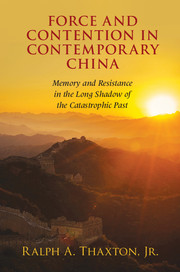 Force and Contention in Contemporary China
Force and Contention in Contemporary China Published online by Cambridge University Press: 05 August 2016
When Deng Xiaoping and his allies launched the one-child birth planning policy between 1980 and 1983, a step Tyrene White calls “the most extensive, aggressive, and effective attempt ever made to subject child-bearing to direct state control and regulation,” it was received in the countryside with suspicion and resistance by both farmers and some of the Communist Party cadres whose mission it was to implement it. Western scholarship on the policy tends to focus on the process whereby the central party-state overcame this resistance, thereby imposing its policy, or on popular acceptance of a modified version of its virtuous – though violent – demographic scheme. While such approaches certainly help explain some of the pedestrian forms of popular resistance to state attempts to manage child bearing, they slight a fundamental reason for the swift formation of popular resistance to the birth-planning campaign: this campaign threatened to overstep the boundaries of even the one-child policy and to rely on repressive methods that raised the specter of the Great Leap past, in which the perpetrators of Mao's famine had imposed a de facto no-child policy in Chinese villages, preventing villagers from bearing children. Behind the hostility to the one-child limit, in other words, was the memory of the Great Leap's harm, which had all but destroyed the credibility of official interference in family procreation.
This chapter investigates the evolution of resistance to the implementation of the center's birth-control policies in Da Fo village over the course of the 1980s and particularly the 1990s. The evidence from Da Fo suggests that Chinese villagers had kept alive memories of the party-state as the enemy of motherhood and child bearing. To many villagers, the regimentation of child bearing in the 1990s suggested a transposition of the Maoist context of the Great Leap to that of reform. What they actually were resisting was not the one-child policy per se but rather the attempt of a powerful central party-state to once again secure control over the entire process of procreation. Furthermore, the memory of the Great Leap famine and villagers’ delayed retaliation against Leap-era party leaders affected the willingness of Da Fo's leaders to press the birth-planning policies of Liangmen township, ultimately resulting in the defeat of the most stringent interpretations of the center's policies and their replacement by a conciliatory “bottom-line” local policy that accommodated tillers’ unwillingness to accept a one-child limit on their reproduction.
To save this book to your Kindle, first ensure no-reply@cambridge.org is added to your Approved Personal Document E-mail List under your Personal Document Settings on the Manage Your Content and Devices page of your Amazon account. Then enter the ‘name’ part of your Kindle email address below. Find out more about saving to your Kindle.
Note you can select to save to either the @free.kindle.com or @kindle.com variations. ‘@free.kindle.com’ emails are free but can only be saved to your device when it is connected to wi-fi. ‘@kindle.com’ emails can be delivered even when you are not connected to wi-fi, but note that service fees apply.
Find out more about the Kindle Personal Document Service.
To save content items to your account, please confirm that you agree to abide by our usage policies. If this is the first time you use this feature, you will be asked to authorise Cambridge Core to connect with your account. Find out more about saving content to Dropbox.
To save content items to your account, please confirm that you agree to abide by our usage policies. If this is the first time you use this feature, you will be asked to authorise Cambridge Core to connect with your account. Find out more about saving content to Google Drive.